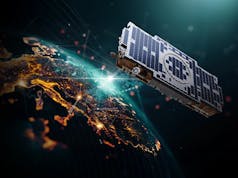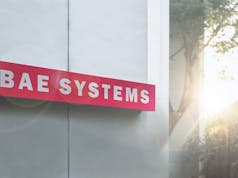The UK and US governments have signed a new agreement paving the way for US companies to operate from UK spaceports and export space launch technology.
UK Ambassador Dame Karen Pierce and U.S. Assistant Secretary of State for International Security and Non-proliferation, Christopher Ford, signed the US-UK Technology Safeguards Agreement, which will enable U.S. companies to participate in space launches from the United Kingdom, on Tuesday 16 June 2020.
According to a news release from UK Space:
“The Agreement means US space and technology companies throughout the supply chain can contribute to and benefit from the commercial opportunities offered by the UK space sector which already employs 42,000 people and generates an income of £14.8 billion each year.”
Science Minister Amanda Solloway said:
“This deal with the US takes us one step closer to seeing the first ever launch into space from British soil. This is a key moment for our commercial space industry, and I look forward to seeing companies from Scotland to Newquay benefiting, and the creation of highly skilled jobs on both sides of the Atlantic.”
Karen Pierce, UK Ambassador to the US said:
“This agreement marks an exciting new area for UK-US space collaboration and represents a significant step towards US companies launching from UK spaceports. The commercial space sector already represents hundreds of millions of dollars in trade between our two countries each year, as well as thousands of jobs on both sides of the Atlantic. This new agreement will generate further growth and prosperity for both our countries.”
The UK Government has already awarded grants totalling nearly £40 million to establish commercial vertical and horizontal small satellite launch from UK spaceports and put in place the necessary regulation to enable the first launches to take place in the early 2020s.
The UK Government’s Spaceflight Programme aims to establish commercial vertical and horizontal small satellite launch from UK spaceports.












That’s good, that will clear the way for space x using UK sites for commercial launches.
There are American companies who will use British launch facilities but SpaceX isn’t one of them. SpaceX already has four launch sites in the US to choose from including their own Texas launch site and is also constructing a fifth – an off shore launch site in Texas. The kind of missions SpaceX is currently involved in and is planning for don’t mesh with what Britain is planning to construct.
Musk tweeted recently about the plans to build offshore launch platforms. He said in that tweet “SpaceX is building floating, superheavy-class spaceports for Mars, moon & hypersonic travel around Earth” (https://twitter.com/elonmusk/status/1272972228326379520).
The “hypersonic travel around Earth” has been mentioned in various Starship presentations and he’s tweeted about it quite a few times so it does at least currently seem to be part of the plan. That I think is where the floating spaceports come into play in places other than Texas because Starship needs at least a 2 mile clear zone around a launch site but, if he does want to run a passenger service, he also needs to be at least somewhat close to the sort of major city destinations that he wants to serve. That’s where I think floating platforms become a very attractive additional option for a passenger Spaceport where for instance finding an uninhabited area that size (approx 12.57 square miles) within striking distance of London for instance, many other cities too, might be challenging and expensive. Deploying floating Spaceports around the world potentially allows him to essentially use established cruise ship and ferry routes where he uses boats to take people between cruise-ship/ferry terminals and the offshore spaceport. Many countries have well established such terminals with good public transport links connecting with the rest of the country.
I do wonder however what would happen if a passenger Starship went technical on such an offshore platform. At an airport such as Heathrow a faulty plane that can’t be quickly fixed in situ can be towed off the stand so that other services can continue but getting an unable-to-fly Starship off the stand in order to clear the launch and/or landing site, especially if mated with a Superheavy booster ready for takeoff, would be a whole different matter.
There are one heck of a lot of challenges remaining if Musk’s dream of hypersonic Earth passenger flights is to come true. Then again, getting from the UK to Australia in under an hour, other destinations even less, is quite a dream. (Being able to travel between any two cities in the world in less than an hour – spaceports at each end permitting of course – is the claim.)
Didn’t the Italians used to make launches from a Kenyan Offshore Platform?
I’m not sure but there was a multinational initiative called “Sea Launch” with 36 launch attempts between 1999 and 2014 mostly successful, only 3 failures – https://en.wikipedia.org/wiki/Sea_Launch
The thing is though that Sea Launch was only launching Zenit 3SL rockets that are 59.6m high. A fully stacked Starship will be 120m tall but integral to the concept is that the launch tower has an integrated crane at the top so that the passenger or cargo vehicle (the second stage) gets stacked onto the first stage booster actually at the launch site using that integral crane. That plus what will need to be huge blast deflectors underneath means that I would expect the launch structure on a SpaceX off shore launch pad to be about 150m high!
Also, the first stage thrust of a Starship is 72,000 kN vs 8,180 kN for the Zenit 3SL first stage so the blast deflectors and noise suppression systems needed at the base of the stand are going to be of a totally different order of magnitude.
If SpaceX can pull it off it’s going to be one hell of an engineering feat. I wish them well though in all of their endeavours. Starship has the potential to totally revolutionise pretty much every aspect of space operations even if practical considerations (such as vehicles going technical on the launch pad) prevent the dream of commercial Hypersonic passenger travel between Earth cities from becoming a reality.
No the one I’m thinking off was Italian government, but also used rather small Scout rockets.
For Starship I think first things first, get it flying. Musk should have enough on his hands getting a Starship to the moon in the next few years, and to be honest I think hypersonic Earth-Earth travel is going to be a bit of a non-starter, remember Concorde? It stopped flying for a reason.
Hi Jonathen,
What it will do is enable Virgin Orbital which I think is actual a US company, but even it is isn’t they are likely to have US companies in there supply chain. As this link highlights they are possible the launch customer for the Cornwall Spaceport. So this agreement is a key enabler to let that deal go through.
https://spaceportcornwall.com/
Cheers CR
The sceptic in me wonders whether, in time, this might also be a shoe-in for US companies to buy into and and then possibly take over the site. Just a thought.
But then BAE has been hoovering up US companies for years…
CR I think virgin orbit will only use Cornwall if they can develop a better booster module for the rocket, if they continue with the 747 then high altitude launch then will use Cornwall as the launch area but can use Newquay’s runway as its about 1000ft to short.
Hi Longtime,
Actually there is good reason to launch from high latitudes, such as from Cornwall. Easy access to polar or highly ellipitical orbit (HEO). Both of these are needed for various reasons e.g. navigation LEO satellites and scientific research into radiation belts respectively…
https://space.stackexchange.com/questions/457/is-there-any-advantage-in-launching-spacecraft-from-a-high-latitude-or-why-was
So I would suggest that there is good commercial reason to launch from Cornwall Spaceport.
Cheers CR
let’s hope their next try is successful.
We would need to invest many billions to have manned or even space Ex iss resuply rockets to fly from the UK and it’s just not worth it with the massive infrastructure already in USA. However we can corner the lucrative small satelite launch market in the UK.
Many billions?
Musk raised $1.33 by in 2019. Not sure how much his investments have put in to date, but they are launching satellites an BASA gave put in 3bn to SpaceX to build a manned capsule.
Avoiding the manned effort, just making rockets has now become economic. So its enterprise as opposed to bureaucracy that ought to show the way for us.
Yes many billions, lots of the hard work was already done by NASA for space x missions, without NASA space x wouldn’t be where it is, we have no infrastructure That already exists and building the expertise and launch site and rockets, safety equipment ect ect will cost many billions, but it’s pointless launching large rockets from the UK Anyway as it’s far more efficient launching from the equator as the earths rotation helps alllot.
Unless they build something to resupply in a polar orbit there is no reason to launch resupply missions from UK soil or indeed any launch site in the northern latitudes thanks to the assist gained from launching at the equator (the surface of Earth is travelling faster there). Our niche will be polar orbits using small satellites, something we build a large share of anyway.
5hats probably wht the French have still got land in South America where they launch European rockets, French Guiana I think. Shame the UK couldn’t use somewhere like Ascension Island, but that would cost many billions for a large rocket site setup.
Bit of a bugger to supply that kind if material to as well I’d imagine.
Fingers crossed, but I don’t think we’ll get very far unless we can strike a deal to build and assemble oribtal launch systems in the UK. Maybe the various buisnesses see something I don’t but I’m skeptical of the willingness for customers to pay for rockets to be transported from Bocca Chica, Long Beach, or New Zealand when there are launch sites much close to the production lines.
The small sat market being targeted and the orbits best accessed from the UK can be served by companies in the UK. Vertical launch from the north of Scotland requires quite small, easily shipped rockets, though to be honest while very far from difficult I suspect more local suppliers will be better able to supply the market.
SpaceX are not a consideration, there is no benefit for them. Virgin Galactic an the horizontal launch space tourist market from Cornwall is another matter.
I think you are closest to understanding the nature of what’s going on here. As far as I know the market is predominantly about the niche for not only micro satellites which we are leaders in, but also about the orbits than can best be served by a northerly launch site as the market increases. That’s why Northern Scotland was always favorite for the vertical launch. Considering this is all about lowering costs and thus expanding the market to new technology/business sectors, that cost and convenience can outweigh closeness of rocket build to the actual launch port though related rocket production in Britain does add to the potential cost savings so both are working in unison here too it seems to fully e ploitative the potential.
Which is why I included New Zealand in the list, Rocket Lab specialises in small rockets for Microsat launches, but unless they decide to build Electron Rockets in the UK, I can’t see how it will make economic sense for them to launch from Scotland.
IMO the way to make this work is to convince companies like Rocket Lab to produce rockets in the UK, and encourage native ones like Skyrora (though I think they want to build their own space port).
Virgin Galactic I can kind of see launching from Cornwall, but Virgin Orbital less so.
Are there any advantages launching from Britain as opposed to the sites SpaceX, ULA, ect already use?
Much much easier and cheaper to launch into polar orbits from here then it is from Florida
Wonder if the Huawei issue will raise its head, US commits funding, we press ahead with development…then ‘ oh hang on UK, remember our beef with Huawei…maybe you should drop them if you still want this money and tech support’
Let’s not think small….There is the polar orbit market yes, but that’s not really why you go for Scotland. In truth Scotland is potentially a great place for Launching great big loads into heliosynchronous obits. Guess what you launch into an heliosynchronous obit….weather sats, ocean observation sats and……..things that the military use that need or like a constant angle of illumination. Scotland does not need to be a niche Launch site launching micro sats. it Has the potential to be the best site for lofting 5000lb earth observation satellites as well. if the infrastructure is built up.
So I know Orbex are looking at the micro sat market, but that’s because that’s the launch vehicle they are developing. There nothing to stop you building the infrastructure for larger booster and start challenging Ракетно-космический центр “Прогресс” .
Go space camp…